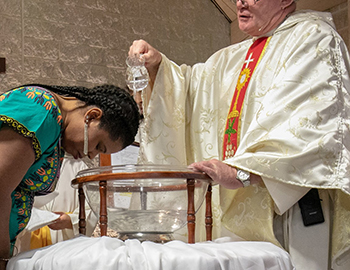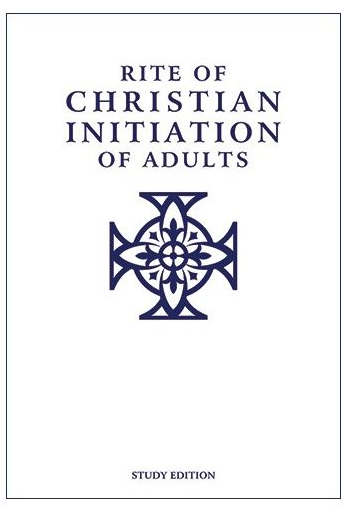It’s called the Great Commission!
In Matthew’s Gospel, the resurrected Jesus told his disciples to go out into the world, to share the Good News and to baptise in the name of the Father, Son and Holy Spirit (Mt 28:16-20). The Commission was great because all those who were baptised were expected to go and do the same.
For 2,000 years, Catholics have taken Jesus’ commission seriously, otherwise Christianity would have failed to grow. However, when we look at the Rite of Christian Initiation of Adults (RCIA) landscape in Australia, the task of baptising and making disciples is struggling in some parishes.
Over the next few editions of The Bridge, the National Centre for Evangelisation will explore the RCIA process and how its use has the power to transform the life of a parish community.
We hope these articles provide encouragement and stimulate conversation in your parish.
What is the RCIA?
The RCIA Study Guide, a key document for guiding the process, states that the RCIA is a:
“Spiritual journey for adults that varies according to the many forms of God’s grace, the free cooperation of the individuals, the action of the Church, and the circumstances of time and place.”[1]
There is a lot to unpack in this statement, which is why a careful reading of the RCIA Study Guide is essential for anyone working in the ministry of accompanying adults (and children) on the journey to full initiation and beyond. In summary, though, the RCIA process requires attention be given to the individual needs of each enquirer, ensuring they receive suitable pastoral, liturgical and catechetical formation. The goal of such formation is the ongoing conversion of the individual’s heart and mind to Christ. The beauty of the RCIA process is that, when done well, it provides encouragement to all the members of the parish in their own journey of conversion.
Thus, the RCIA is so much more than a defined program with a set curriculum that a person who wants to become a Catholic attends; success is not measured by the number of lessons attended and where various milestones are checked off.
Parishes across Australia, indeed the world, will have variations in the way they approach the RCIA process locally. The question we would like to pose is: when was the last time your parish reviewed its approach to this important ministry?
How well is RCIA working in your parish?
In 2020 I undertook a survey of almost every parish in Australia as part of my theological studies. The response was poor, with less than nine per cent of parish communities contributing to the survey. However, the information gleaned confirmed what was being reported in the Plenary Council’s listening and dialogue sessions[2]. Parishioners from across Australia commented on the desire for better RCIA processes alongside related issues such as the need for greater adult faith formation and more effective sacramental programs.
Through the Catholic Enquiry Centre phone calls and emails, we are also aware that some parishes do not offer the RCIA process, with some people who are interested in becoming Catholic being advised they might need to contact another parish. No doubt there could be good reasons for this, but it is concerning that a parish would give this response. We should welcome these enquirers with open arms and be ready to share with them our love for Jesus and the Catholic faith.
I invite you now to reflect on the context of your own parish. How many of these boxes would you tick?
- Our parish has a vibrant RCIA process, with well-trained catechists and the support of parishioners.
- We have the RCIA process, but it’s a bit hit-and-miss.
- Our parish does not offer the RCIA process.
- If a person enquires about becoming a Catholic, we quickly put a team together, or the parish priest or a volunteer provides instruction.
- The same people have been running the RCIA process for a long time – no other parishioners are willing to assist.
- If someone enquires about becoming Catholic, we suggest they go to another parish where it is offered.
- We would like to offer the RCIA process, but don’t know how to start.
- We have tried to offer the RCIA process, but the parish priest is not supportive.
As noted, there could be valid reasons why the RCIA process is not offered, or why the ministry sometimes struggles. And sometimes the dilemma is what is the point of offering the RCIA process if there aren’t any enquirers, or why invite people to consider becoming Catholic if there isn’t a process in the parish to accompany them?
Is this dilemma an issue for your parish?
Have you been thinking about developing a RCIA process in your parish?
If the answer is yes, then pray about what role you might have in developing the RCIA process. Maybe you simply want to raise it in the parish as an area of concern. Maybe you have had some religious formation and would like to train further to be a catechist who could assist with the process. Maybe you have a friend or family member who wants to be a Catholic and you want to accompany them.

A successful program will mean parishioners who lead other ministry groups and parishioners in the pews getting to know, and accompanying, those on the initial stages of their faith journey and beyond.
Finally, parishioners will also need to advocate for you in those spaces and places where they meet people thinking about becoming Catholic or completing their Sacraments, for example, in parish schools or at Christmas or Easter Masses. Parishioners should always be “inviters” or “evangelisers”, ready to share their love for Jesus and what it means to be Catholic.
Do you need further support?
If this article has encouraged you to think and act in this space of adult initiation, that’s terrific. If you need more encouragement or support, especially if you don’t have a parish pastoral council (PPC) or parish leadership team, then here are some practical ideas:
1. Contact your diocesan office and speak to whoever is responsible for RCIA. See what support they can offer.
2. If you do not have diocesan support, then useful information about the RCIA can be found on the Christian Initiation Australia Network You can also become a financial member of this network and receive newsletters and other updates about RCIA.
3. TeamRCIA is a US-based group dedicated to RCIA. There is good material on their website for free, but a subscription will allow you to tap into their extensive resources (noting there are small variations between the US and Australian version of the RCIA).
4. Contact the National Centre for Evangelisation; we are here to help with your enquiries or to simply be a listening ear.
We hope this article is helpful. Our next article will focus on “conversion” and why it’s critical to the RCIA process.
Words: Sharon Brewer
References:
'Are parishes ready, willing and able to welcome people into the Catholic faith?' (The Bridge)
'Listen to what the Spirit is saying: Final report for the Plenary Council: Phase 1: Listening and Dialogue' (National Centre for Pastoral Research)
[1] ICEL, Rite of Christian Initiation of Adults (Study Guide), (Sydney: St Paul’s Publications, 2018), 4.
[2] Dantis T, Bowell P, Reid S, Dudfield L. Listen to What the Spirit is Saying. Final Report for the Plenary Council Phase 1: Listening and Dialogue. FINAL-BOOK-v7-spread-version-LISTEN-TO-WHAT-THE-SPIRIT-IS-SAYING.pdf (catholic.org.au). Accessed November 23, 2021.



